Table of Contents
There is arguably nothing more important to the world than critical thought. It is critical thought that causes us to pause before doing what we are told. Without critical thinking, we are mere pawns of our lower passions and the commands of authority. With critical thinking, we become our own masters.
What’s more, it is a lack of critical thinking that is responsible for a number of atrocities, both big and small. Few things in the world are more dangerous than a mass of men who have decided not to think for themselves. While we cannot control the actions of others, we can begin making the world a better place simply by thinking for ourselves and encouraging others to do the same.
This is why the powerful always seek to censor freedom of speech. Free access to free ideas is kryptonite to those who would be tyrants. It is important that we are confronted with ideas that make us uncomfortable, if only because it serves to make our own convictions more deeply held, more nuanced and more adaptable to new information.
An attack on freedom of speech is an attack on our facilities of critical thinking itself.
These are some of our favorite quotes on critical thinking and free speech from some of the greatest minds in history.
Aristotle
“It is the mark of an educated mind to be able to entertain a thought without accepting it.”
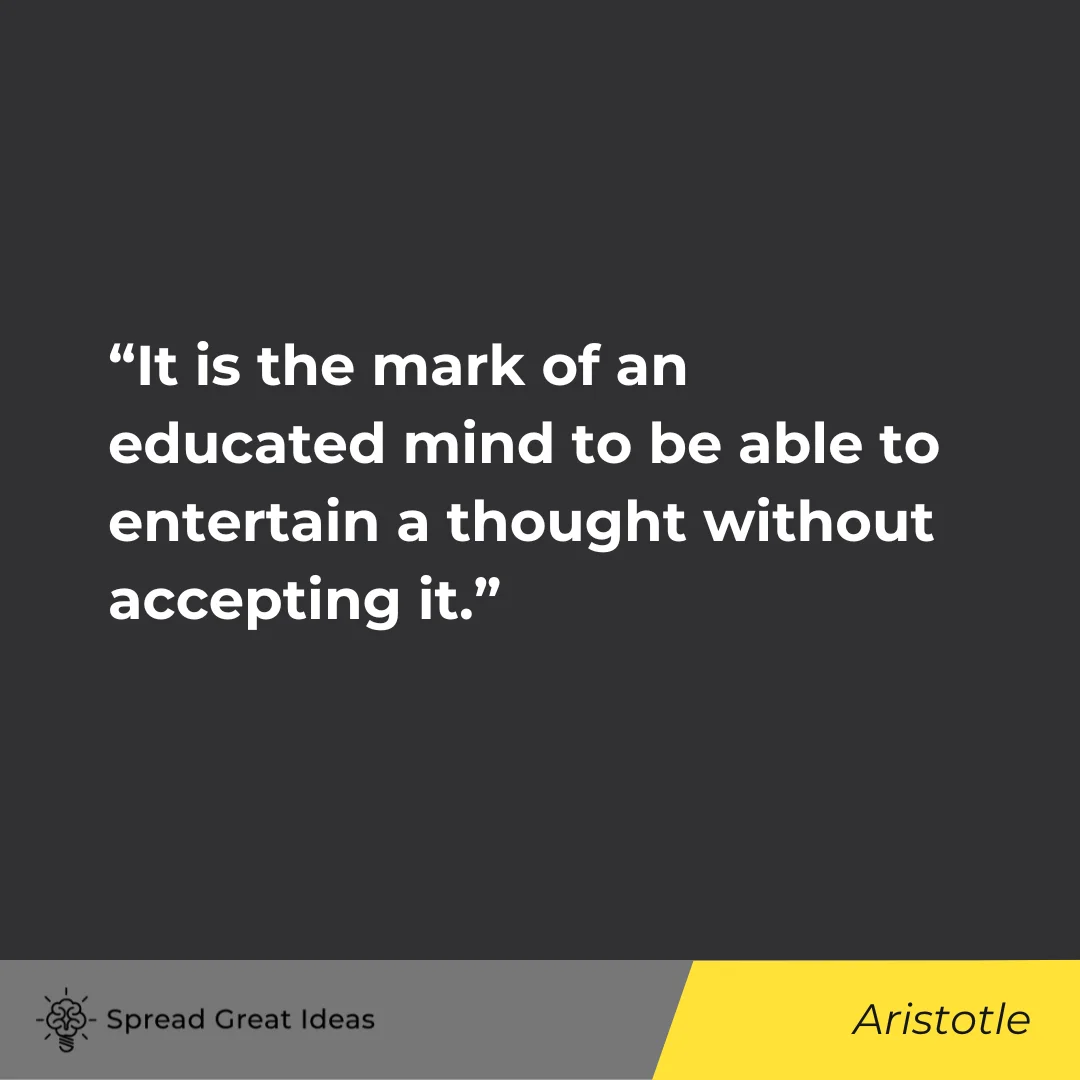
Aristotle’s quote encapsulates a key aspect of intellectual maturity and open-mindedness. He suggests that true education involves the ability to consider diverse perspectives and ideas without immediately embracing or rejecting them. By stating that it is the mark of an educated mind to entertain a thought without accepting it, Aristotle emphasizes the importance of critical thinking and intellectual flexibility. This quote highlights the value of examining viewpoints objectively and engaging in reasoned discourse, rather than succumbing to dogma or prejudice. It underscores the capacity for intellectual growth and enlightenment that comes from being open to exploring and evaluating different beliefs and concepts.
Eric Hoffer
“You can discover what your enemy fears most by observing the means he uses to frighten you.”
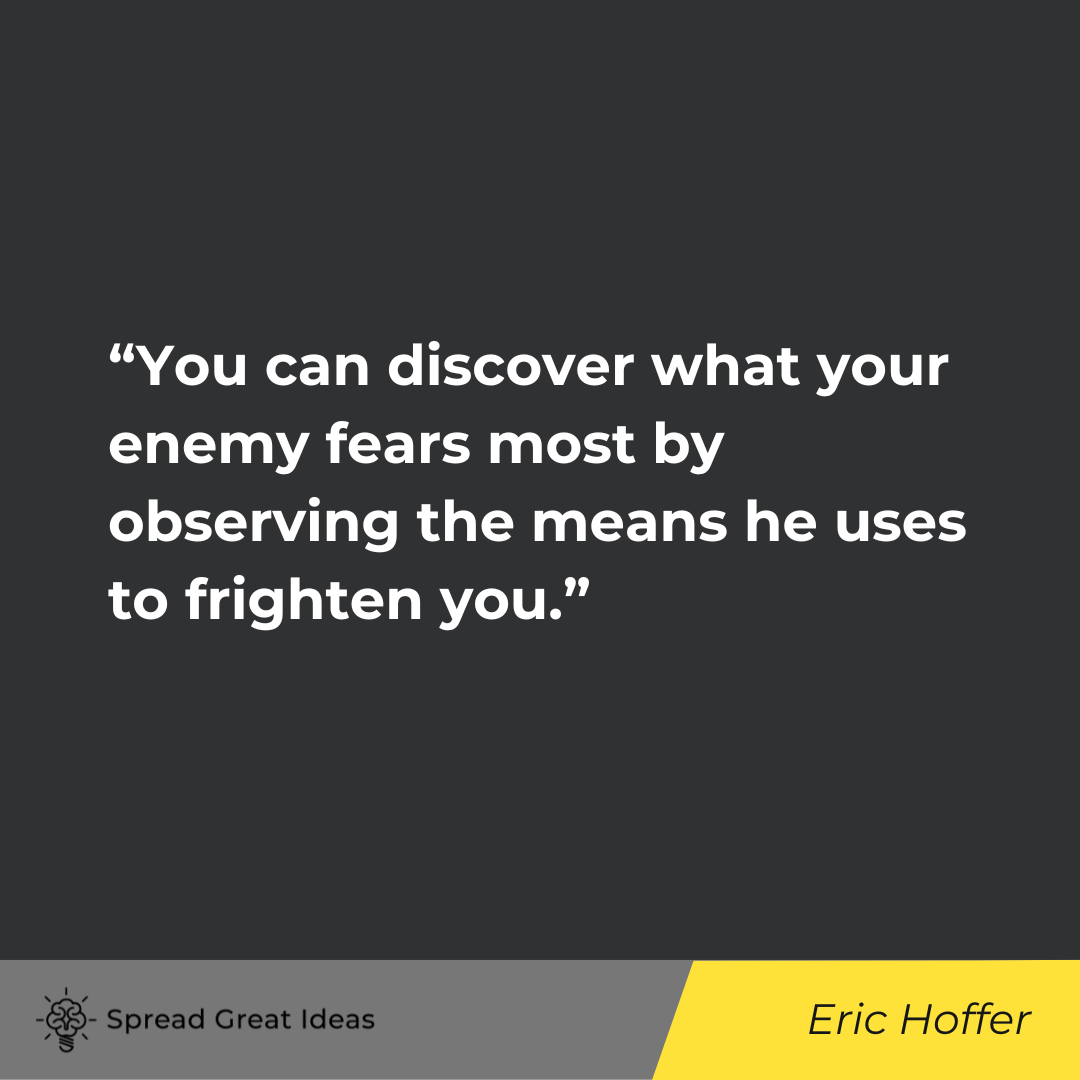
Eric Hoffer’s quote offers insight into understanding the motivations and vulnerabilities of one’s adversaries. He suggests that by observing the tactics and methods used by an enemy to induce fear, one can discern the aspects that they themselves find most threatening. This quote underscores the importance of perception and observation in assessing the intentions and weaknesses of opponents. By analyzing the strategies employed by adversaries, individuals can gain valuable insights into their fears and motivations, enabling them to better anticipate and respond to their actions. Overall, the quote highlights the significance of vigilance and strategic thinking in navigating conflicts and adversarial relationships.
Voltaire
“Those who can make you believe absurdities can make you commit atrocities.”
– Voltaire
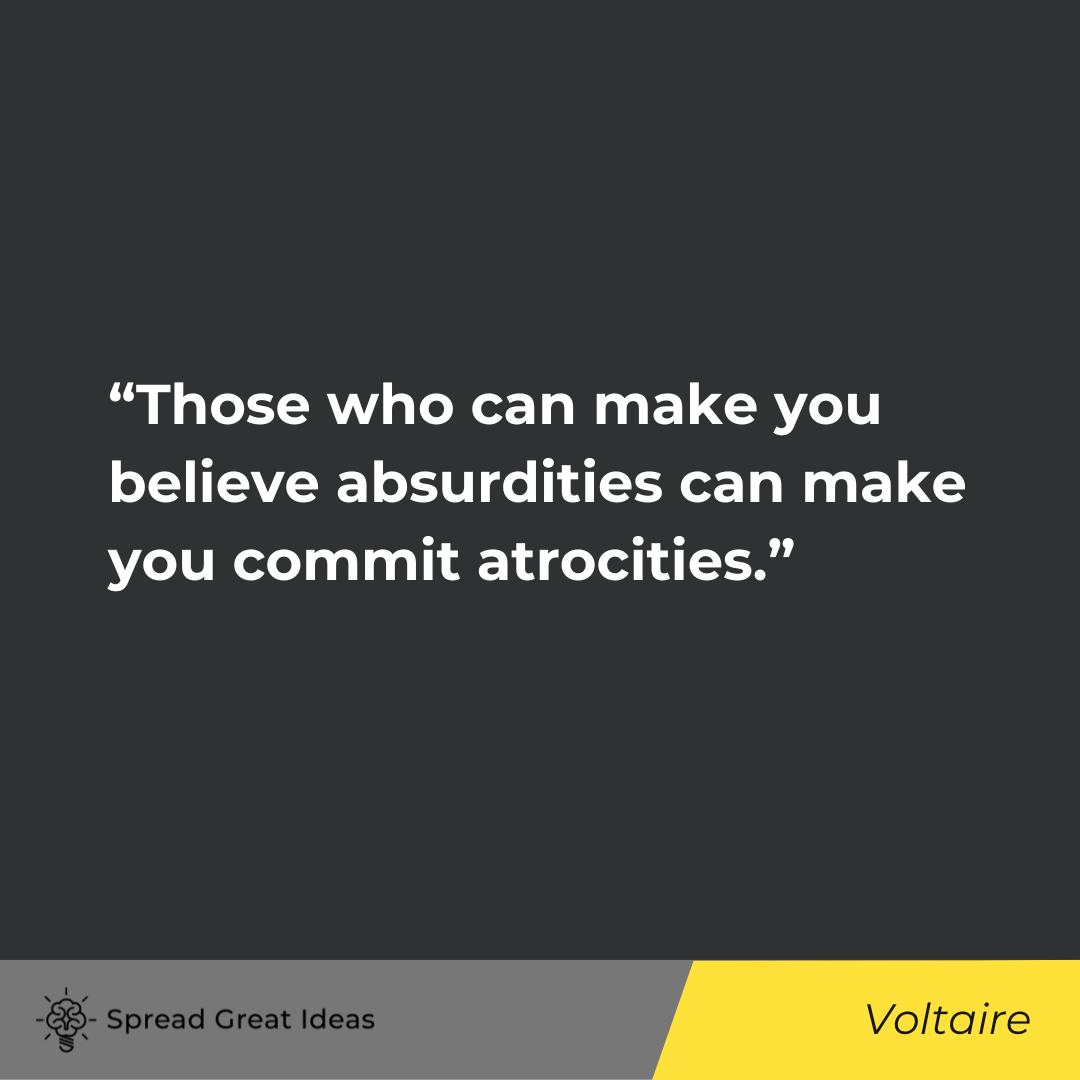
Voltaire’s quote succinctly captures the dangerous power of manipulation and persuasion. He suggests that individuals or entities who have the ability to convince others of absurd or irrational beliefs also possess the potential to incite them to commit heinous acts. This quote serves as a cautionary reminder of the susceptibility of human beings to influence and propaganda. It underscores the importance of critical thinking and skepticism in evaluating the ideas and messages presented to us. By recognizing the correlation between belief in absurdities and the potential for committing atrocities, Voltaire warns against the dangers of blind obedience and encourages vigilance in the face of manipulation.
Carl Jung
“…the relatively unconscious man driven by his natural impulses because, imprisoned in his familiar world, he clings to the commonplace, the obvious, the probable, the collectively valid, using for his motto: ‘Thinking is difficult. Therefore, let the herd pronounce judgement.'”
– Carl Jung, Psychology and Religion: West and East
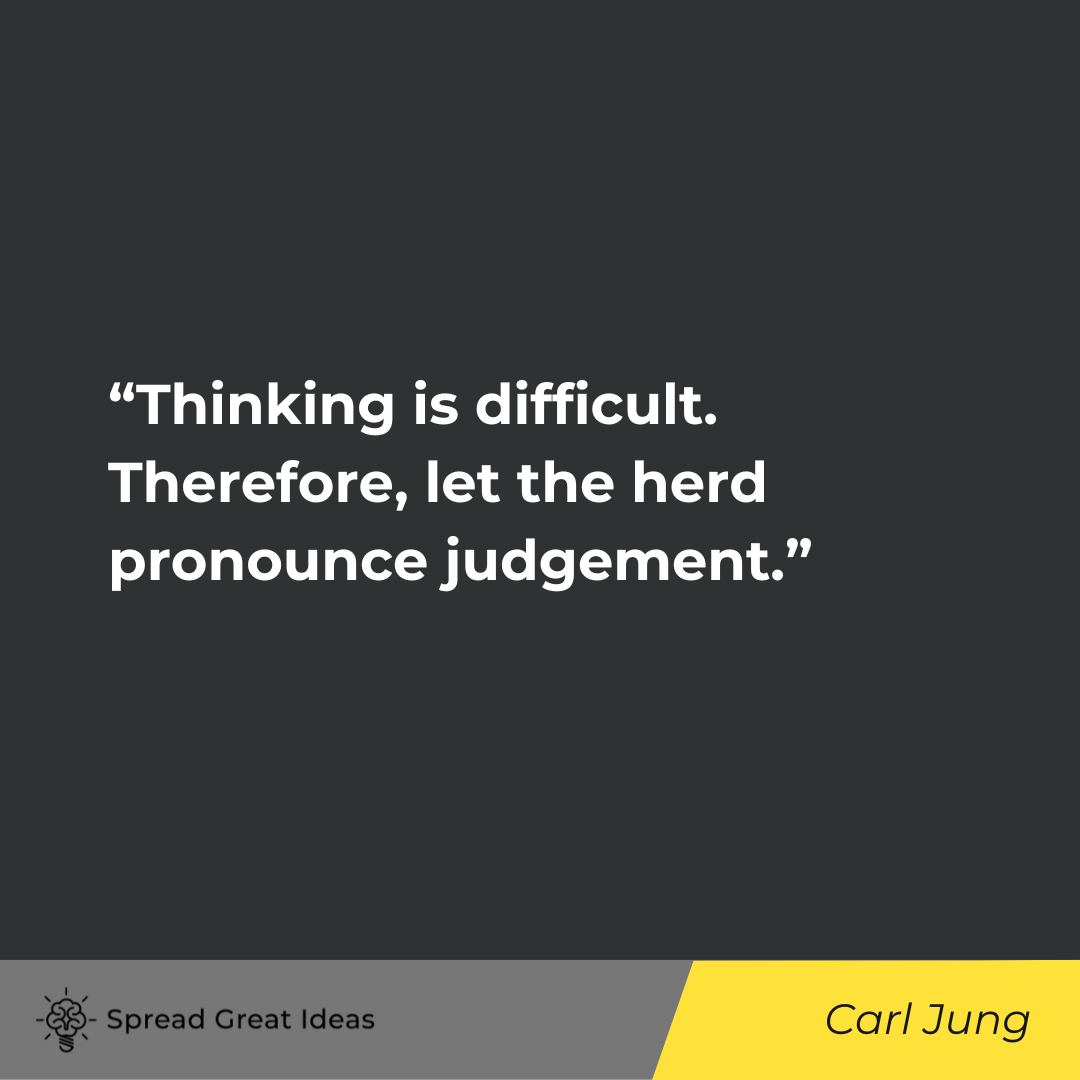
Carl Jung’s quote describes how many people, driven by instinct and trapped in societal norms, prefer to follow familiar beliefs rather than think for themselves. They find comfort in conformity and rely on the collective judgment of the group instead of trusting their own ability to think independently.
Andrei Sakharov
“Do not trust governments more than governments trust their own people.”
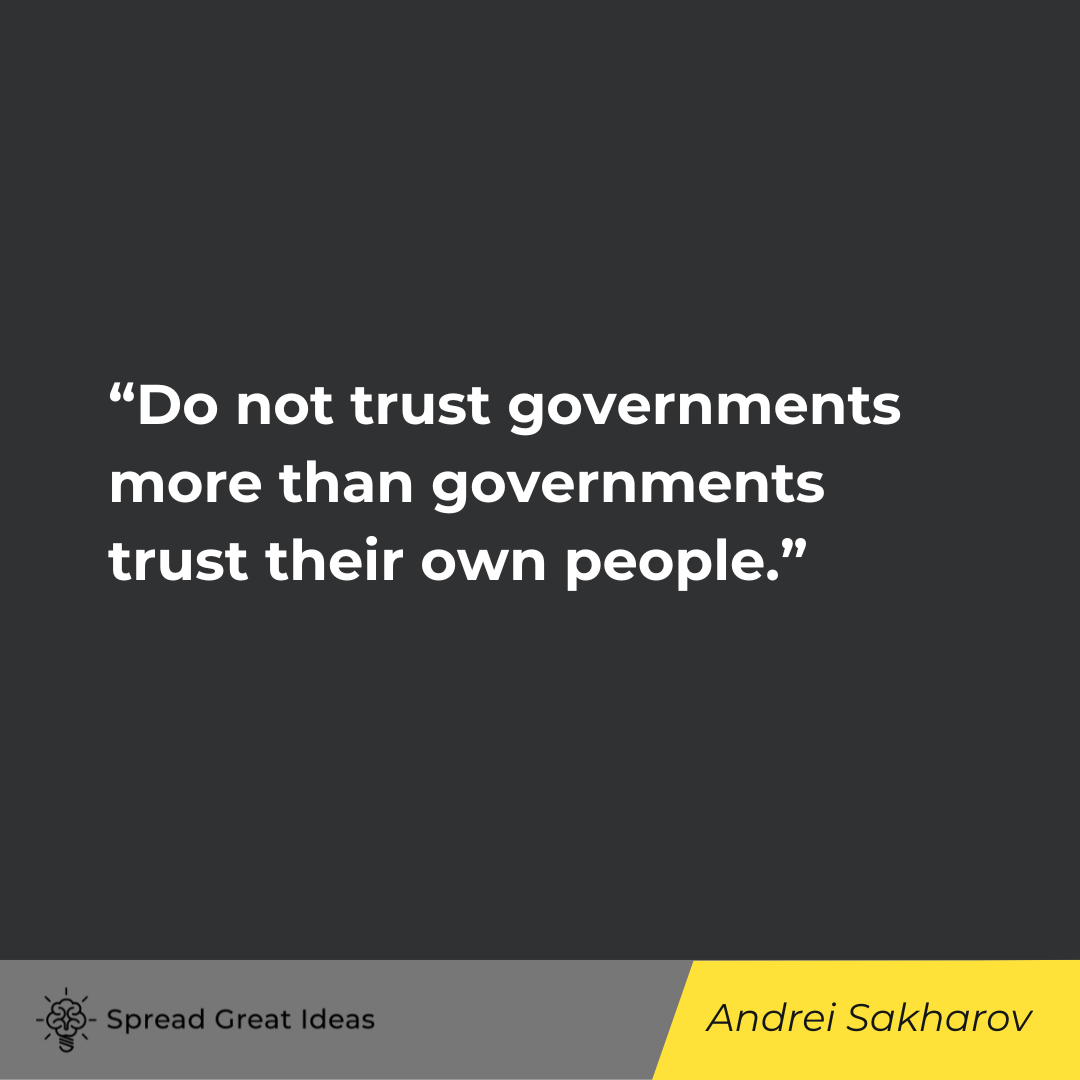
Andrei Sakharov’s quote cautions against placing blind trust in governments, emphasizing the importance of maintaining a healthy skepticism towards those in positions of power. He suggests that individuals should not trust governments more than governments trust their own citizens, highlighting the need for transparency, accountability, and mutual respect between the governing authorities and the governed population. This quote reflects Sakharov’s advocacy for human rights and civil liberties, as well as his belief in the empowerment of individuals to hold their governments accountable for their actions.
August Wilhelm von Hofmann
“I will listen to any hypothesis but on one condition — that you show me a method by which it can be tested.”
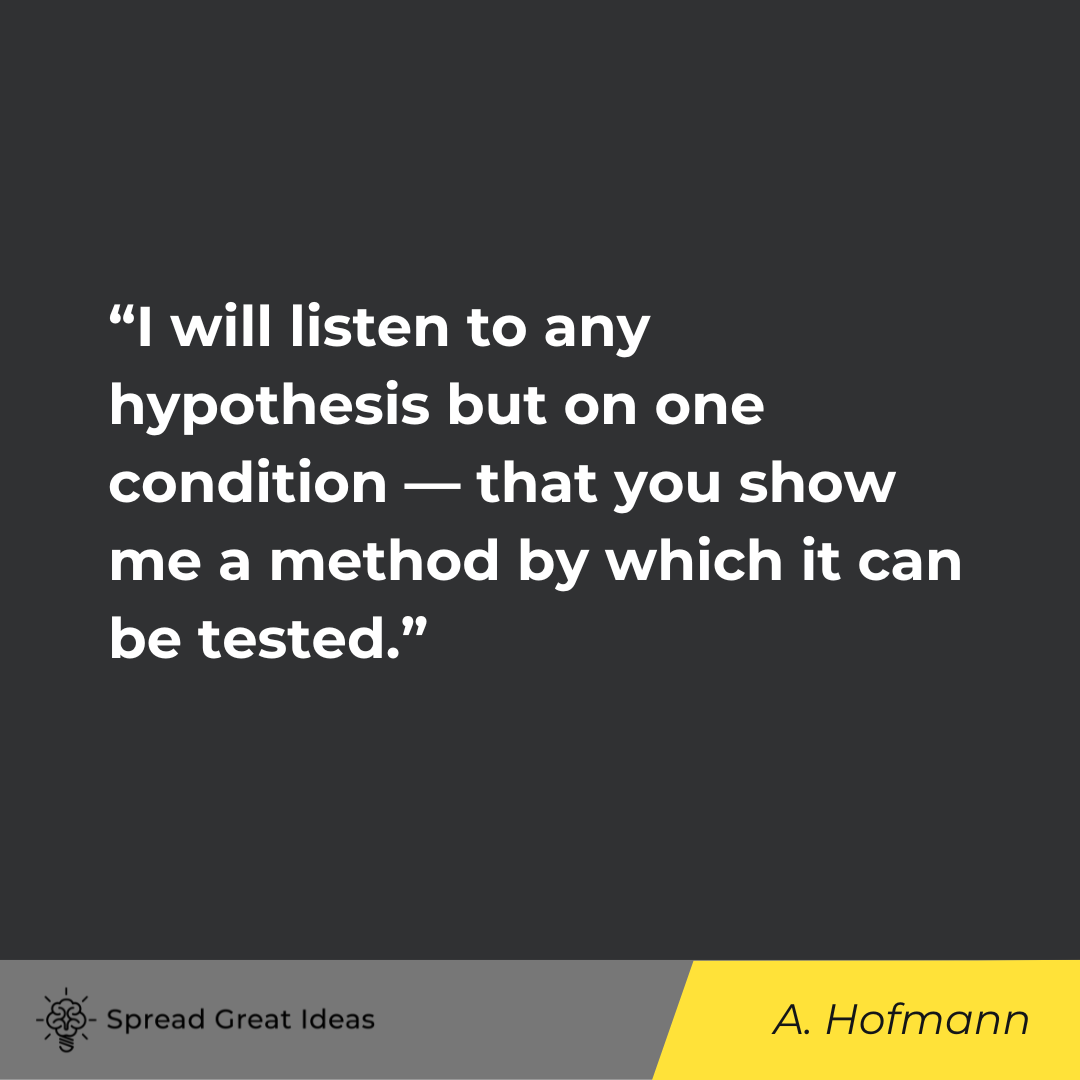
August Wilhelm von Hofmann’s quote emphasizes the importance of empirical evidence and scientific methodology in evaluating hypotheses. He expresses openness to considering various ideas but imposes the condition that they must be accompanied by a method for testing their validity. This requirement underscores the scientific principle of falsifiability, which states that for a hypothesis to be meaningful, there must be a way to potentially disprove it through observation or experimentation. Hofmann’s quote reflects a commitment to rigorous inquiry and the pursuit of knowledge based on evidence and empirical testing rather than unfounded speculation.
General James Mattis
“Engage your brain before you engage your weapon.”
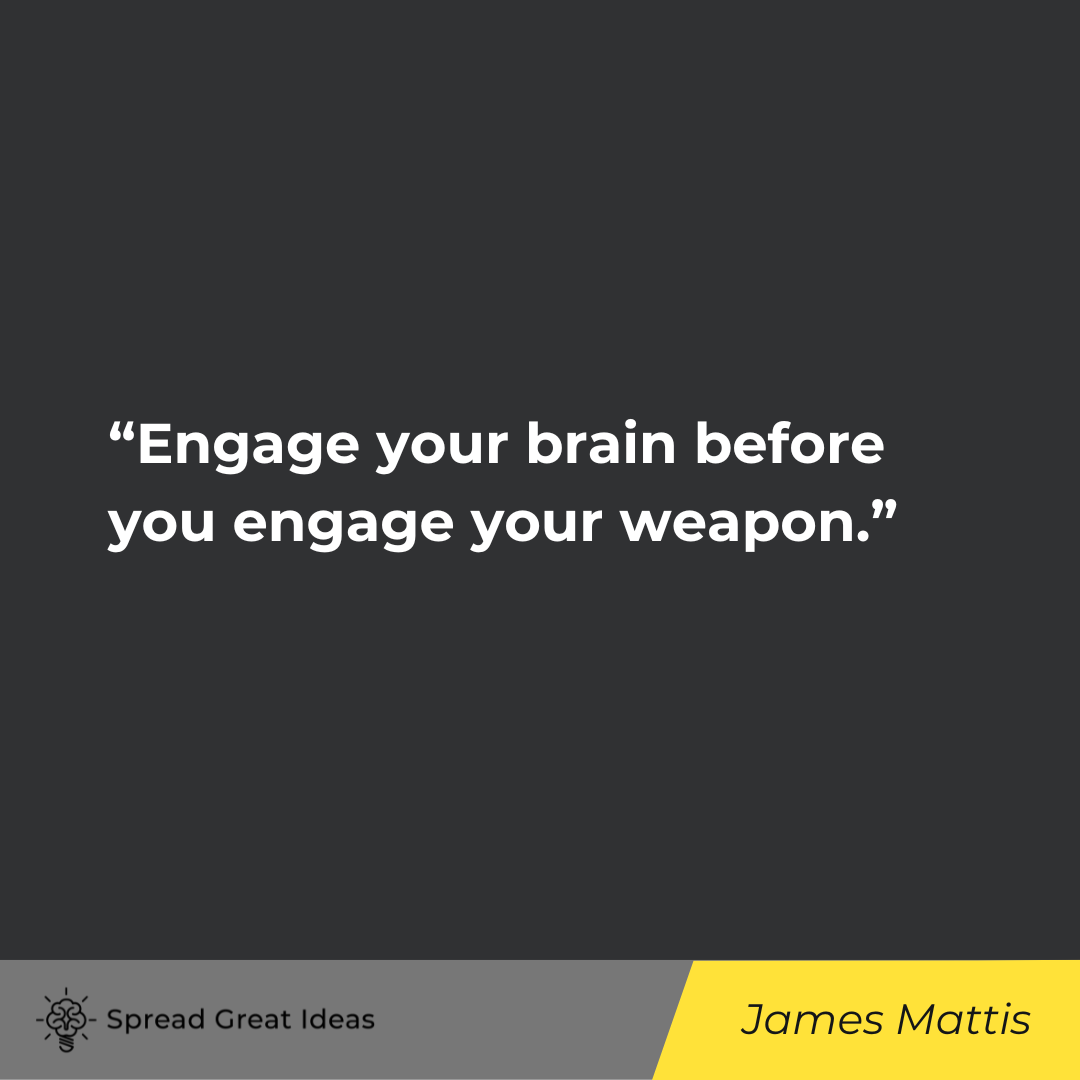
General James Mattis’s quote underscores the importance of critical thinking and deliberation before resorting to violence or conflict. He advises individuals to consider their actions carefully and use their intellect to assess situations before reacting impulsively with force. This quote reflects Mattis’s emphasis on strategic decision-making and the avoidance of unnecessary conflict. It serves as a reminder of the power of rationality and thoughtful consideration in resolving disputes and maintaining peace.
Jose Marti
“The first duty of a man is to think for himself.”
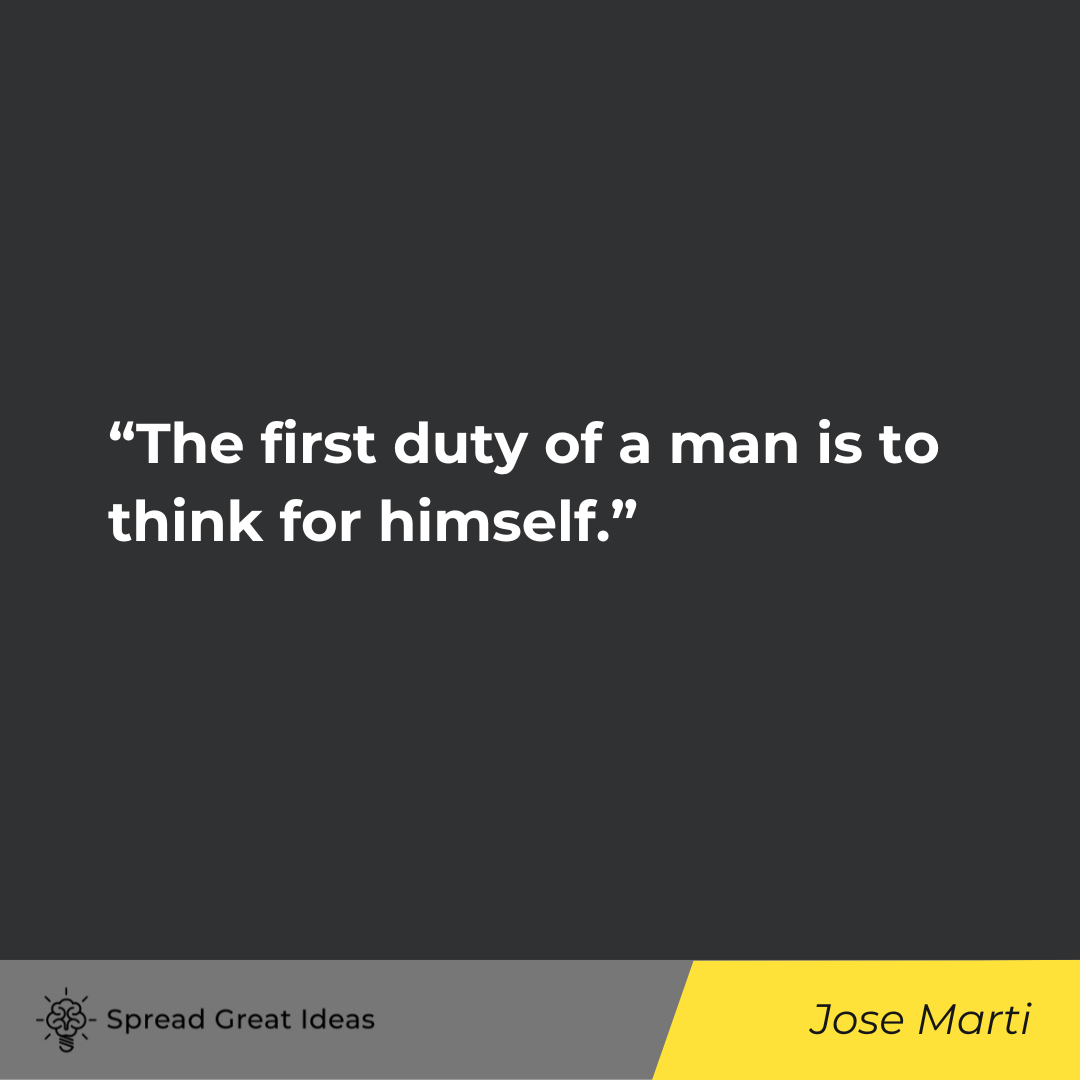
Jose Marti’s quote emphasizes the fundamental importance of independent thought and individual autonomy. He asserts that the primary responsibility of every person is to engage in critical thinking and form their own opinions, rather than blindly accepting the ideas or beliefs imposed by others. Marti advocates for intellectual freedom and self-reliance, suggesting that true fulfillment and integrity come from exercising one’s own cognitive faculties and arriving at reasoned conclusions. This quote reflects Marti’s commitment to personal sovereignty and the empowerment of individuals to shape their own destinies through independent thought and reflection.
Rod Serling
“We’re developing a new citizenry. One that will be very selective about cereals and automobiles, but won’t be able to think.”
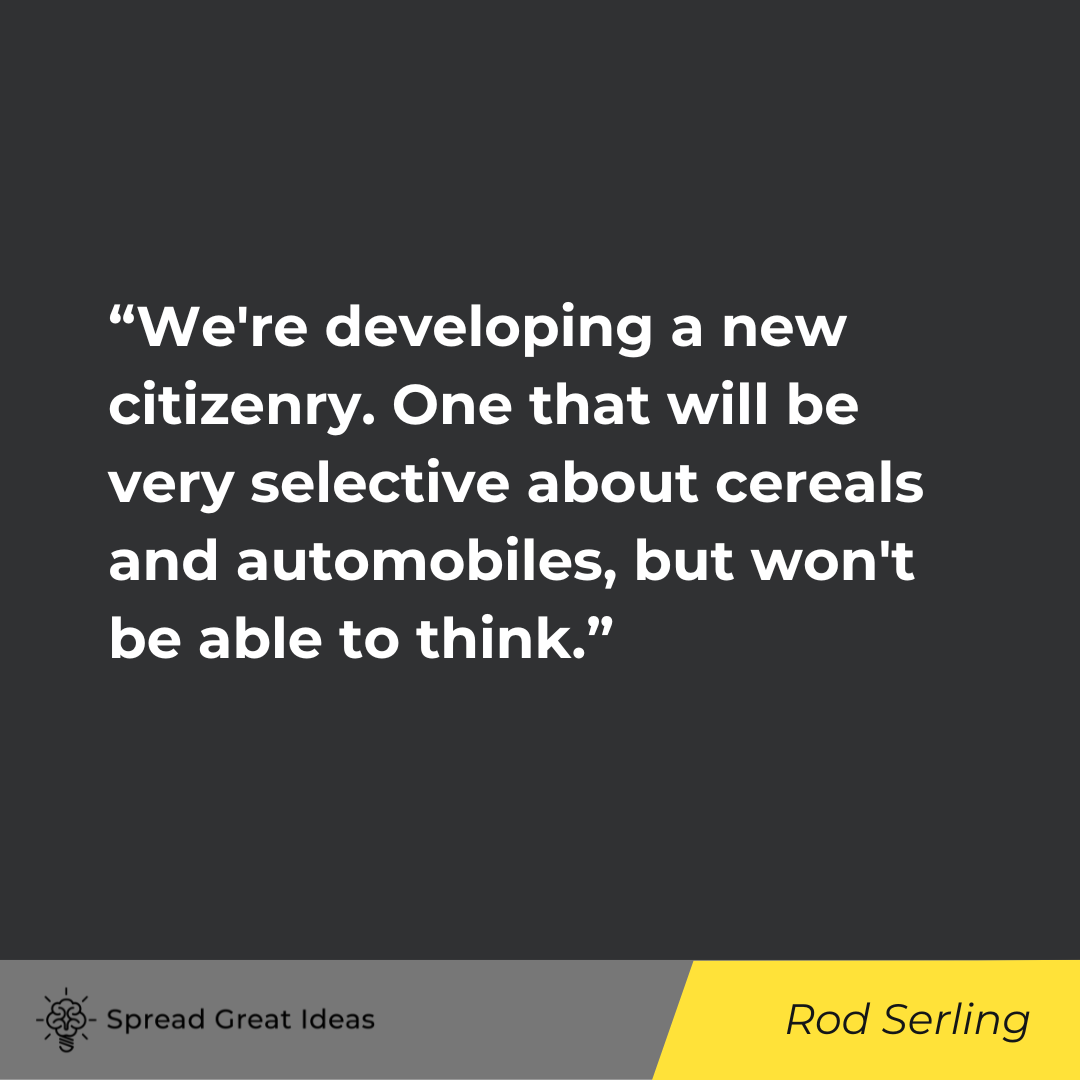
Rod Serling’s quote offers a critical commentary on the direction of society, highlighting a shift towards materialism and consumerism at the expense of intellectual engagement. He observes that while people may become discerning consumers in terms of products like cereals and automobiles, there is a concurrent decline in critical thinking skills. Serling suggests that the emphasis on material goods has led to a neglect of intellectual development, resulting in a citizenry that prioritizes superficial desires over deeper cognitive abilities. This quote serves as a cautionary reflection on the potential consequences of societal values centered around consumer culture, urging individuals to prioritize intellectual growth and critical thought amidst the distractions of modern life.
Unknown
“Even a broken clock is right twice a day.”
– Unknown
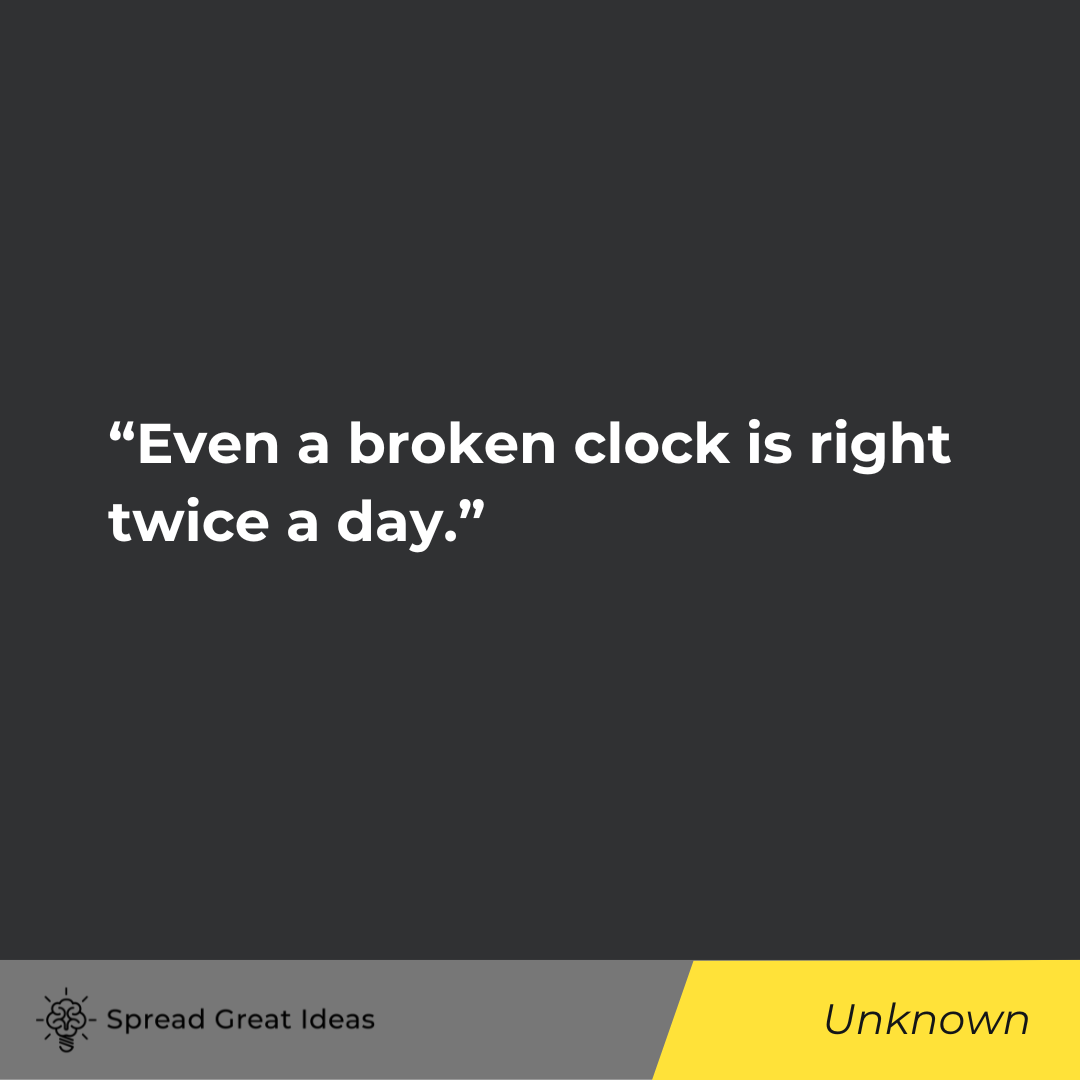
The quote “Even a broken clock is right twice a day” conveys the idea that even something fundamentally flawed or unreliable can occasionally be correct by chance. It serves as a metaphor for acknowledging that even individuals or sources that are typically inaccurate or flawed can still provide accurate information or insights on rare occasions. This quote encourages humility in judgment and underscores the importance of considering all perspectives, even those that may seem unreliable at first glance.
Arthur Schopenhauer
“The majority of men… are not capable of thinking, but only of believing, and… are not accessible to reason, but only to authority.”
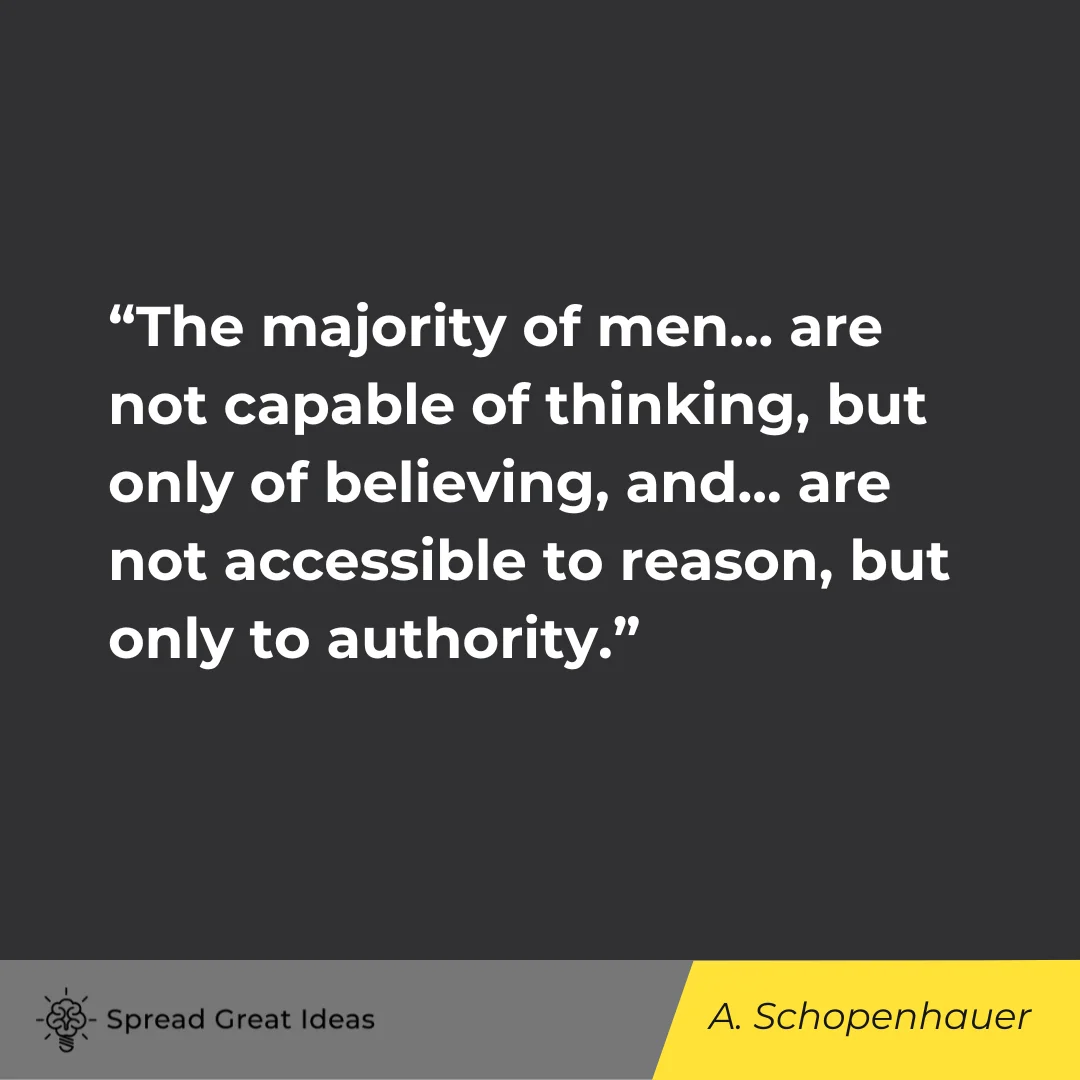
Arthur Schopenhauer’s quote delves into the nature of human cognition and belief systems. He suggests that the majority of individuals are more inclined towards belief rather than critical thinking. According to Schopenhauer, these individuals are not easily swayed by rational argumentation but instead tend to defer to authority figures or established beliefs. This observation speaks to the prevalence of dogmatism and the challenges of engaging in reasoned discourse with those who are deeply entrenched in their beliefs. Schopenhauer’s quote serves as a reflection on the complexities of human psychology and the limitations of rational persuasion in certain contexts.
Unknown
“Life is fraught with opportunities to keep your mouth shut.”
– Unknown, often misattributed to Winston Churchill
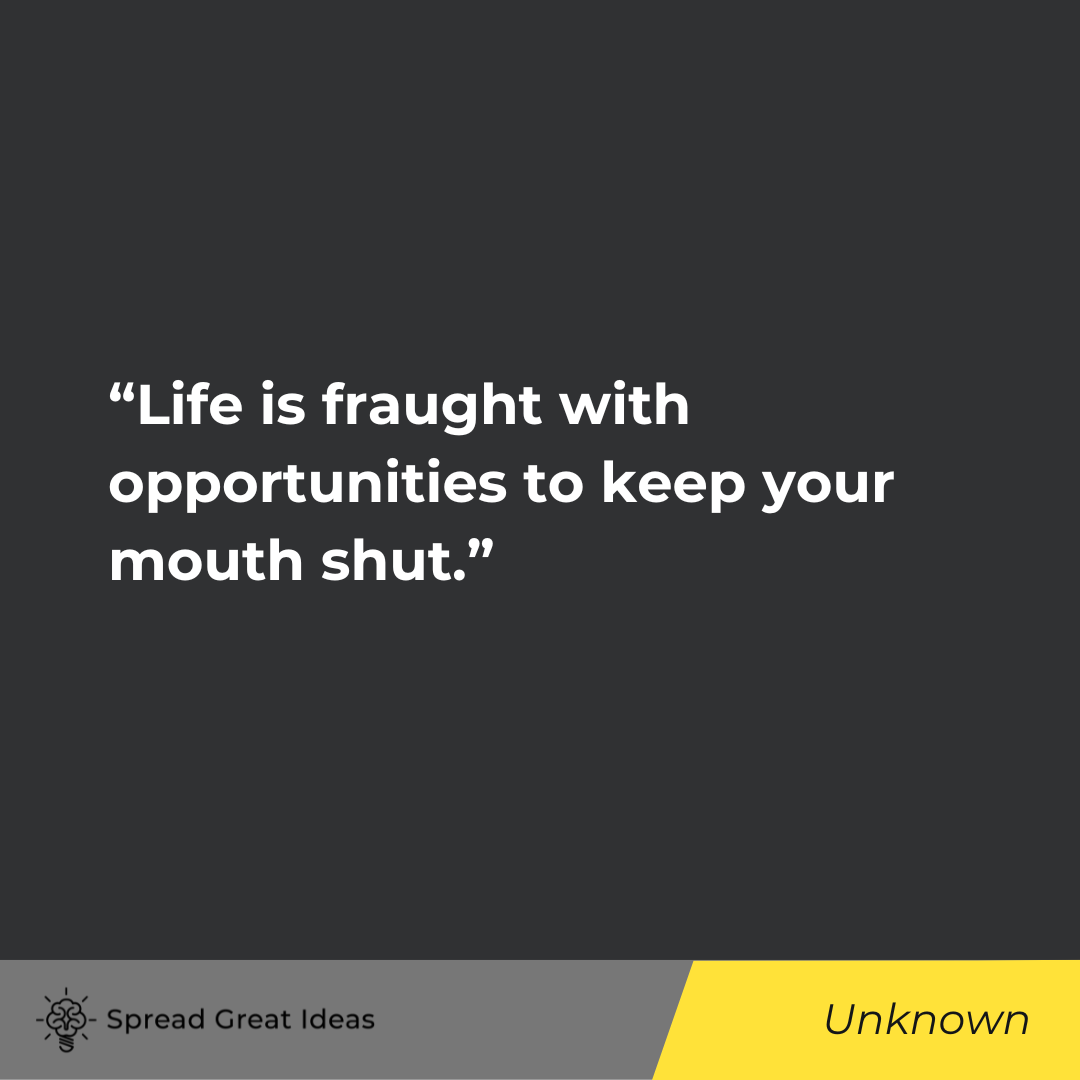
This quote humorously suggests that throughout life, there are numerous occasions where it is wise to refrain from speaking or offering opinions. While often misattributed to Winston Churchill, the true author is unknown. The quote serves as a reminder of the importance of discretion and knowing when to remain silent, especially in situations where speaking may not be beneficial or could lead to unnecessary conflict or misunderstanding. It highlights the value of restraint and thoughtful communication in navigating various social and interpersonal contexts.
Winston Churchill
“Men occasionally stumble over the truth, but most of them pick themselves up and hurry off as if nothing had happened.”
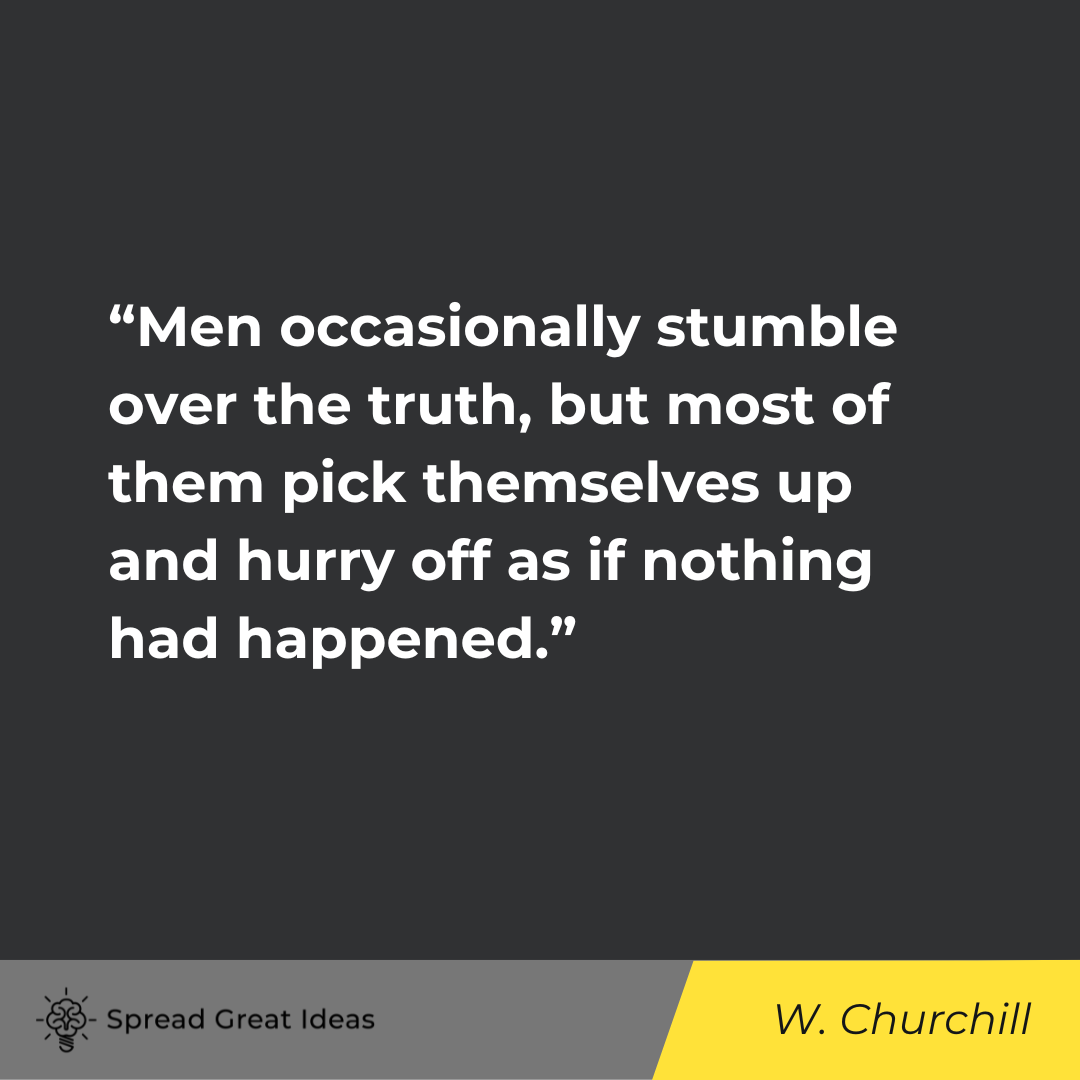
Winston Churchill’s quote humorously highlights the tendency of individuals to ignore or disregard inconvenient truths when they stumble upon them. He suggests that while some people may accidentally encounter the truth, they often choose to ignore it and continue on their original path without acknowledging its significance. This quote serves as a wry commentary on human behavior and the propensity to prioritize convenience or personal beliefs over confronting uncomfortable realities. It underscores the importance of introspection and the willingness to confront difficult truths rather than simply brushing them aside.
Thomas Paine
“It is the duty of everyman, so far as his ability allows, to detect and expose delusion and error.”
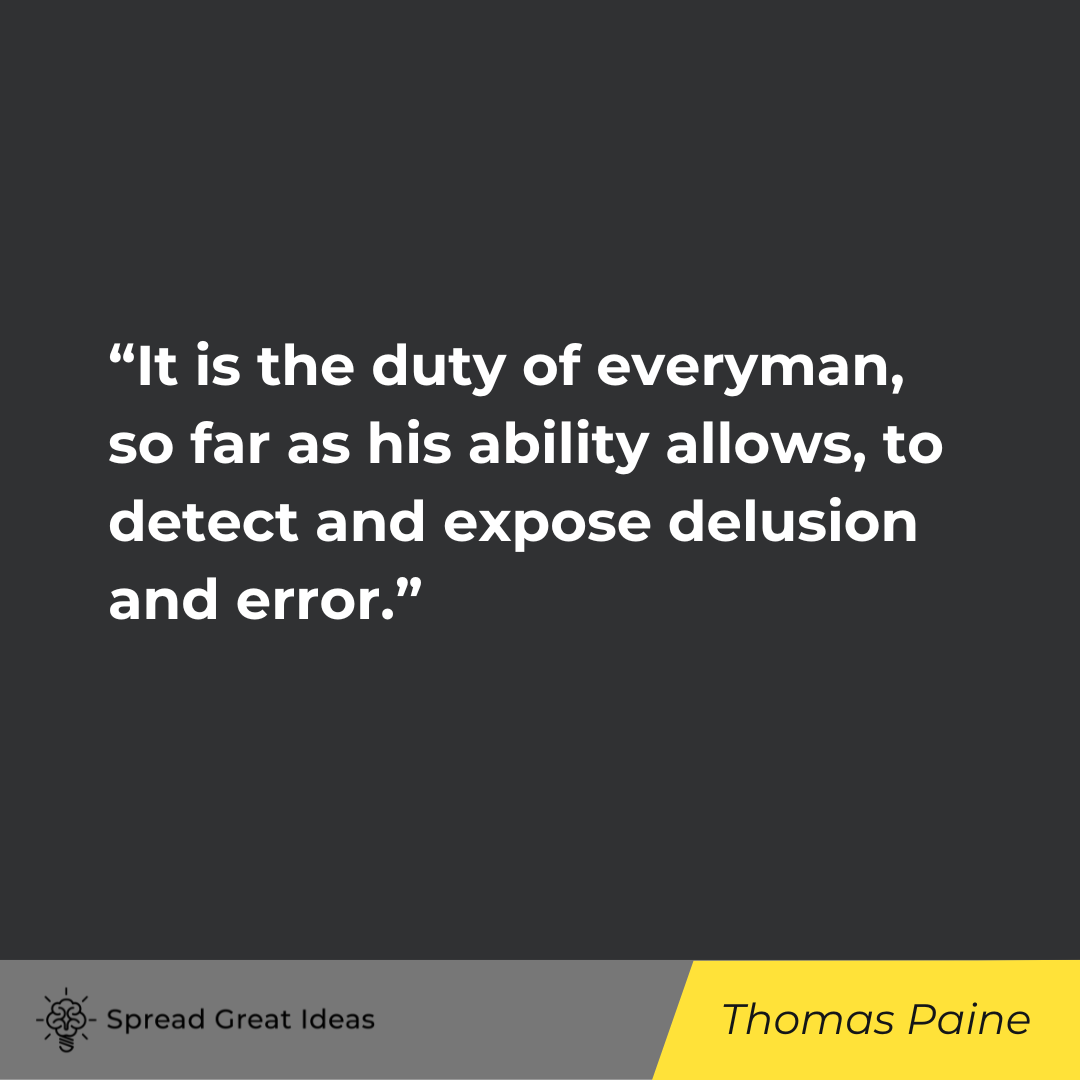
Thomas Paine’s quote underscores the responsibility of individuals to use their intellectual capabilities to identify and challenge falsehoods and misconceptions. He emphasizes that it is the duty of every person, to the best of their abilities, to uncover and reveal deception and mistaken beliefs. This quote reflects Paine’s commitment to truth and rational inquiry, as well as his belief in the importance of critical thinking and skepticism. It encourages individuals to actively engage in the pursuit of knowledge and truth, and to combat ignorance and deceit wherever they encounter it.
Niccolo Machiavelli
“There are three classes of intellects: one which comprehends by itself; another which appreciates what others comprehend; and a third which neither comprehends by itself nor by the showing of others; the first is the most excellent, the second is good, and the third is useless.”
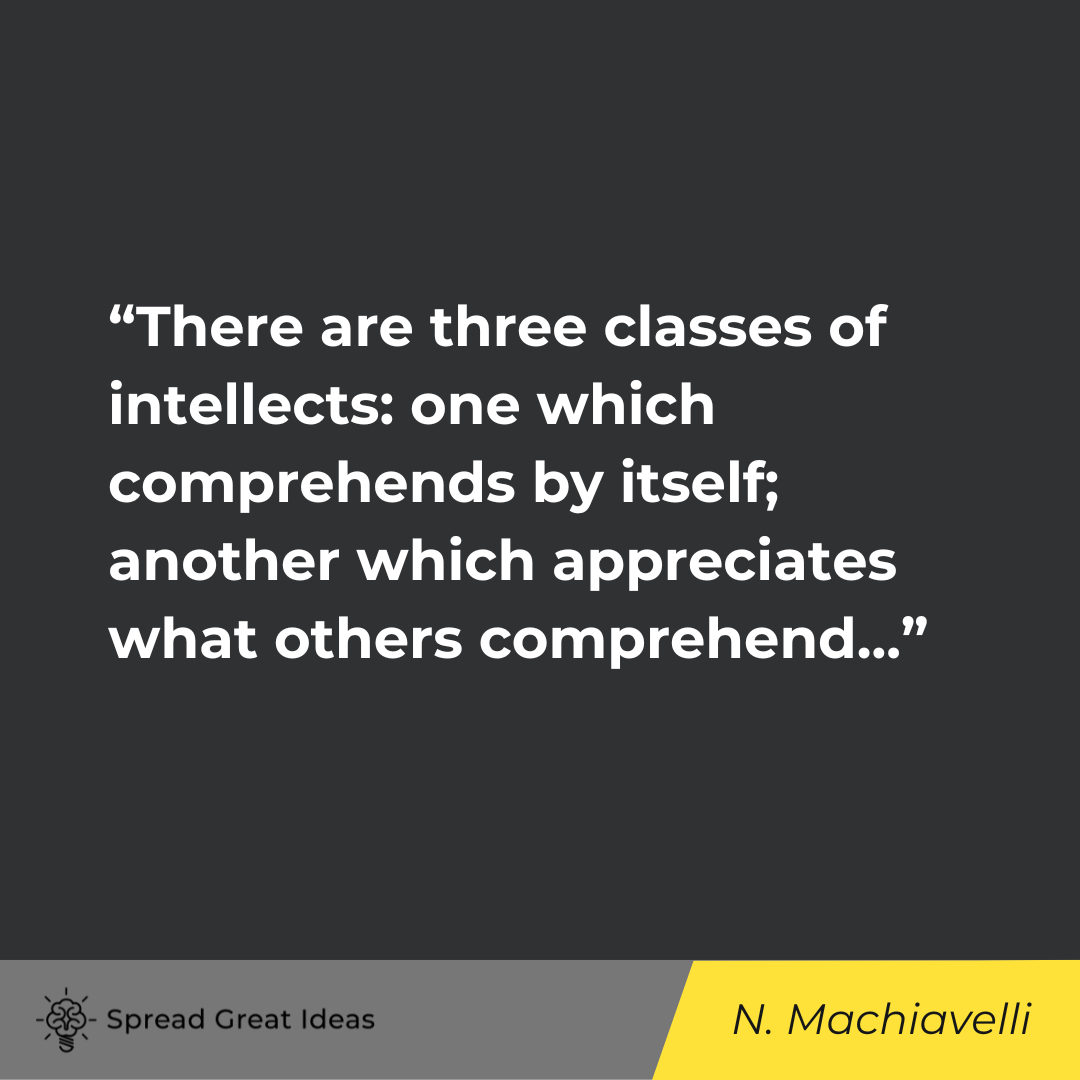
Niccolò Machiavelli’s quote categorizes intellect into three classes based on their ability to comprehend information independently or with the assistance of others. The first class, which comprehends by itself, is deemed the most excellent as it demonstrates autonomy and depth of understanding. The second class appreciates the comprehension of others, indicating a capacity for learning and appreciation. However, the third class, unable to comprehend independently or with guidance, is considered useless. This classification reflects Machiavelli’s pragmatic view of intelligence and its varying degrees of effectiveness.
Albert Camus
“The evil that is in the world almost always comes of ignorance, and good intentions may do as much harm as malevolence if they lack understanding.”
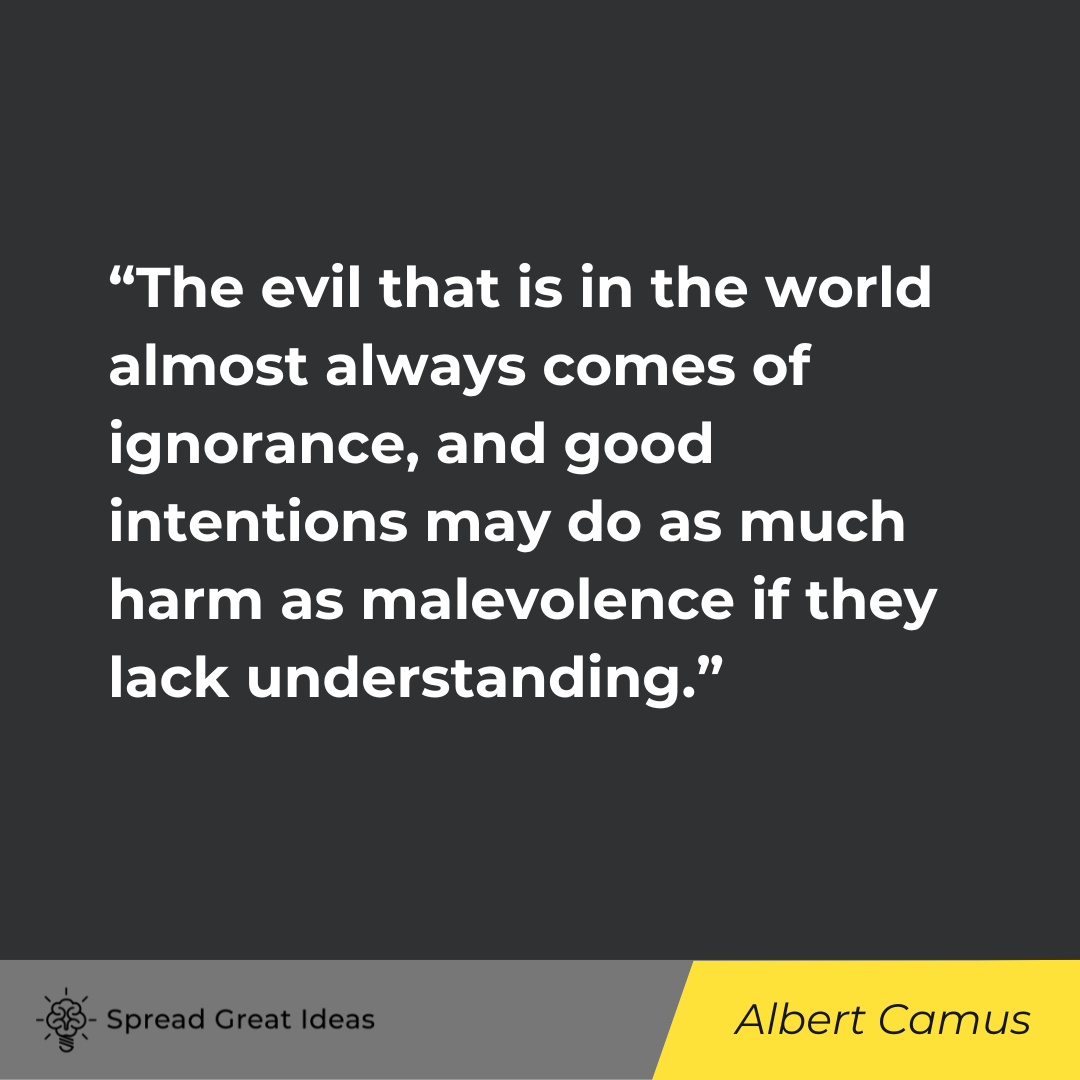
Albert Camus’s quote reflects on the complexities of human actions and their consequences. He suggests that much of the evil in the world stems from ignorance rather than malevolence, indicating that people often act in harmful ways due to a lack of knowledge or understanding. Additionally, Camus warns that even well-intentioned actions can lead to harm if they are not accompanied by a deeper comprehension of the situation at hand. This quote underscores the importance of wisdom and discernment in guiding actions, highlighting the potential dangers of acting without a thorough understanding of the implications.
Jim Rohn
“We need to teach our children how to debate the major life issues. Debate strengthens their beliefs and enables them to defend themselves against ideologies that are going to come their way.”
– Jim Rohn, The Treasury of Quotes
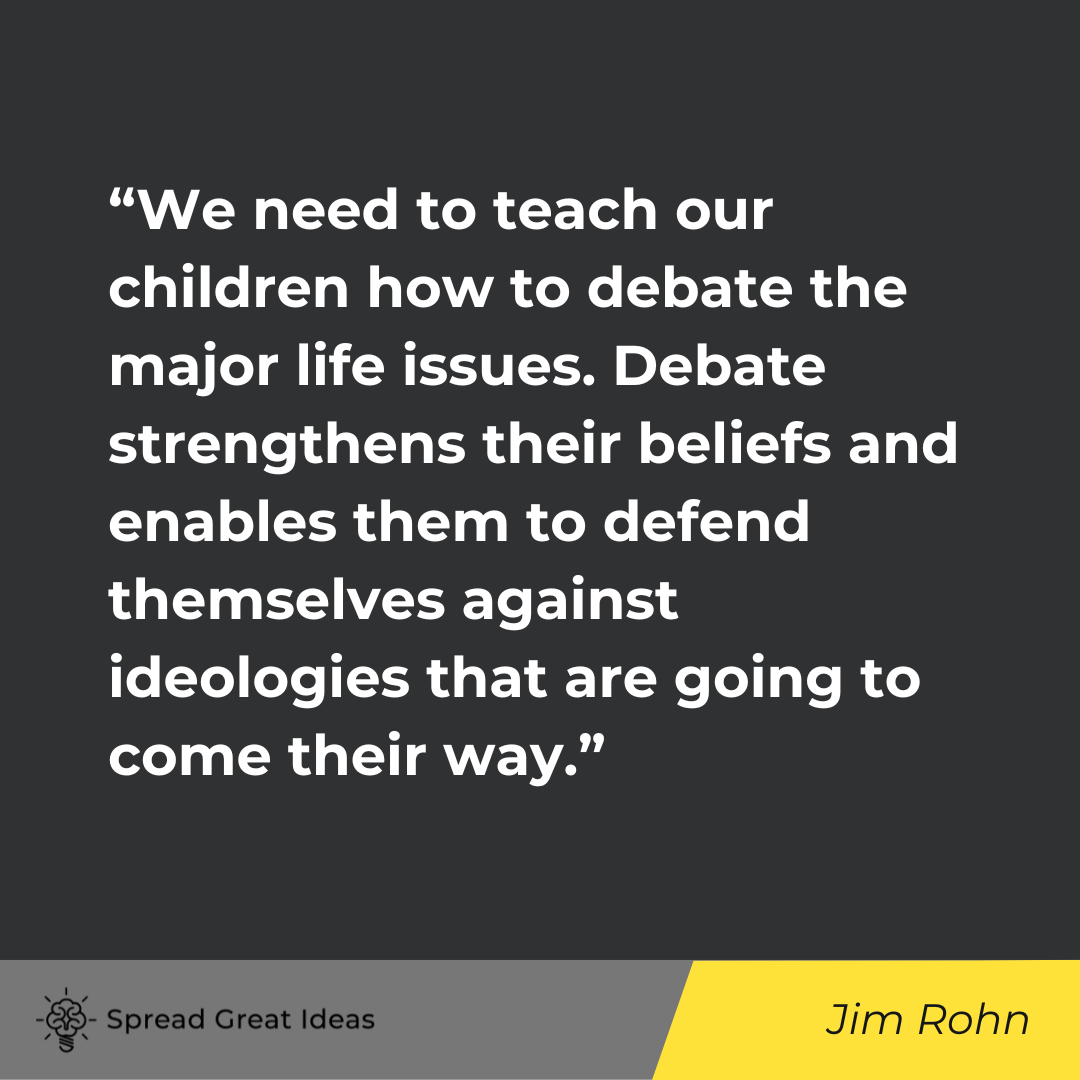
Jim Rohn’s quote emphasizes the importance of teaching children critical thinking skills and the ability to engage in reasoned debate about significant life matters. He argues that through debate, individuals can develop stronger convictions and better defend themselves against opposing ideologies they may encounter. This quote underscores the value of encouraging open dialogue and intellectual discourse from a young age, as it fosters resilience and helps individuals form well-informed perspectives on important issues. Rohn suggests that by equipping children with the tools to engage in meaningful debate, they can navigate the complexities of life with greater confidence and understanding.
Jim Rohn
“One of the great liberal documents of the world is the Declaration of Independence. One of the great conservative documents of the world is the Constitution of the United States. We need both documents to build a country. One to get it started – liberal. And the other to help maintain the structure over the years – conservative.”
– Jim Rohn
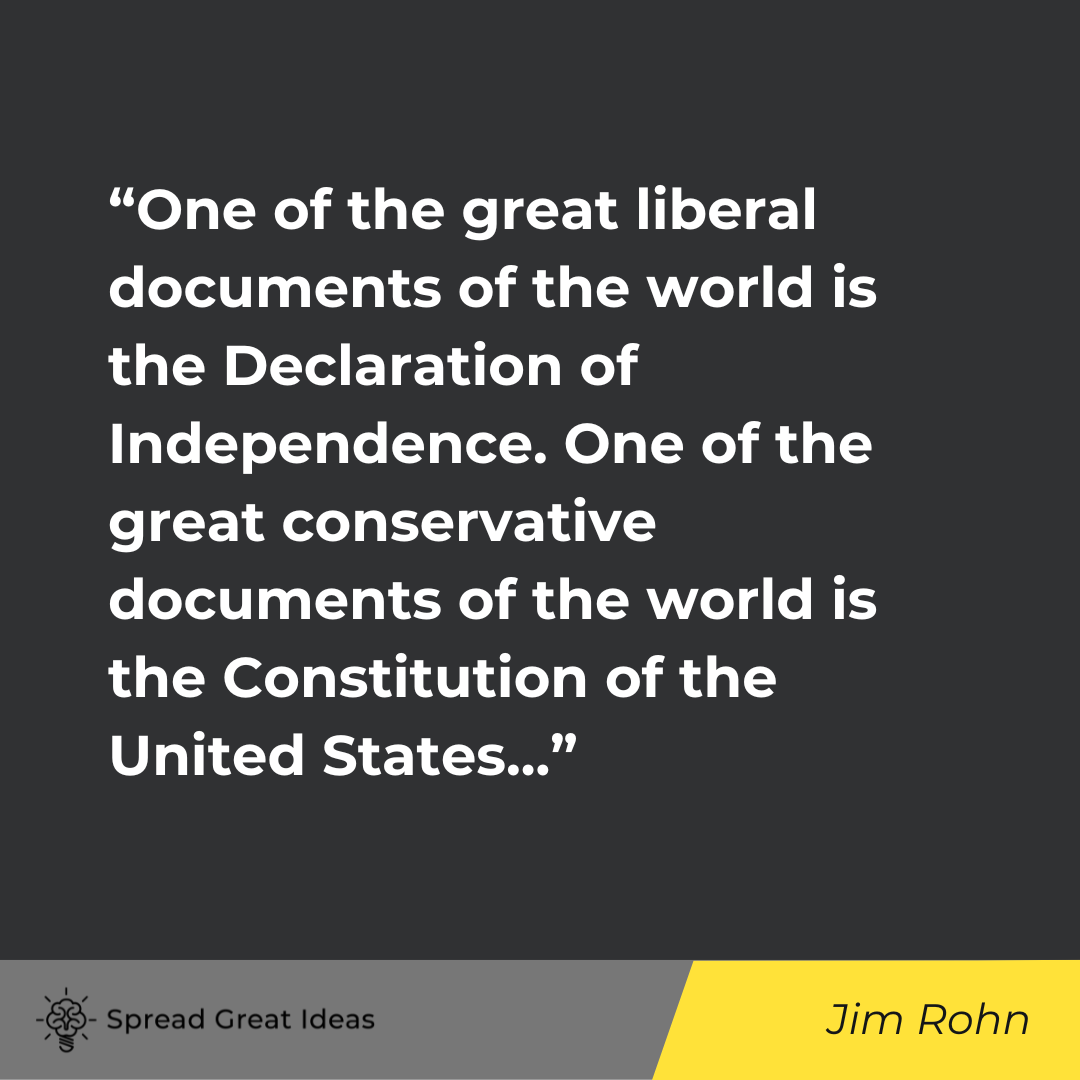
Jim Rohn’s quote highlights the complementary roles of liberalism and conservatism in the foundation and preservation of a nation, particularly referencing the United States. He characterizes the Declaration of Independence as a liberal document, emphasizing its role in initiating change and establishing fundamental principles of liberty and equality. In contrast, he views the Constitution of the United States as a conservative document, essential for maintaining stability and structure over time. Rohn suggests that both liberal and conservative principles are necessary for building and sustaining a country, with liberalism providing innovation and progress while conservatism ensures the preservation of societal order and institutions. This quote reflects Rohn’s perspective on the balancing act between change and tradition in governance and society.
Joseph de Maistre
“False opinions are like false money, struck first of all by guilty men and thereafter circulated by honest people who perpetuate the crime without knowing what they are doing.”
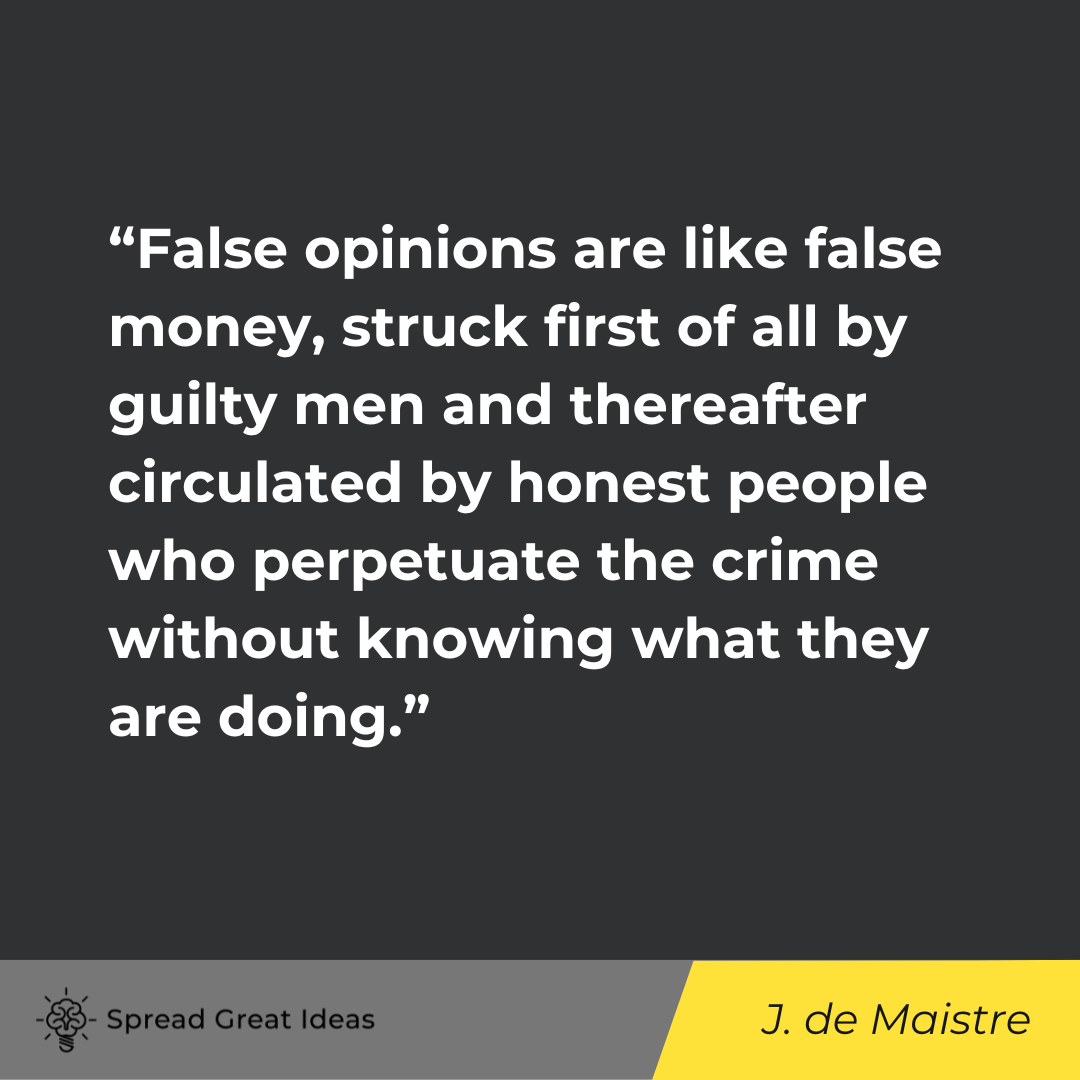
Joseph de Maistre’s quote draws an analogy between false opinions and counterfeit currency, suggesting that both originate from deceptive or dishonest sources. He implies that false beliefs often originate from individuals with malicious intent, who create and propagate them deliberately. However, de Maistre also highlights the unwitting role of honest people in perpetuating these falsehoods through their unwitting acceptance and dissemination. This quote serves as a cautionary reminder about the insidious nature of misinformation and the importance of critical thinking in discerning truth from falsehood. It underscores the responsibility of individuals to question and verify the validity of the ideas they encounter, rather than blindly accepting them at face value.

“Anybody who doesn’t change their mind a lot is dramatically underestimating the complexity of the world we live in.”
– Jeff Bezos
Jeff Bezos’s quote underscores the necessity of adaptability and open-mindedness in navigating the complexities of the modern world. He suggests that a refusal to change one’s perspective or opinions reflects a failure to recognize the multifaceted nature of the world. Bezos implies that the rapid pace of change and the diverse array of experiences and perspectives necessitate a willingness to reevaluate one’s beliefs and opinions regularly. This quote encourages individuals to embrace intellectual flexibility and to remain receptive to new information and ideas, emphasizing the importance of ongoing growth and learning in an ever-evolving world.
Albert Einstein
“If I had an hour to solve a problem I’d spend 55 minutes thinking about the problem and five minutes thinking about solutions.”
– Albert Einstein
Bertrand Russell
“Most people would rather die than think and many of them do!”
– Bertrand Russell
Charlie Munger
“There is hardly anything more important than being rational and objective.”
– Charlie Munger
Charlie Munger’s quote underscores the fundamental importance of rationality and objectivity in decision-making and problem-solving. He suggests that these qualities are paramount in navigating the complexities of life and achieving success. Munger implies that by approaching situations with a clear and logical mindset, individuals can make better-informed choices and avoid the pitfalls of emotional bias or irrationality. This quote serves as a reminder of the value of critical thinking and evidence-based reasoning in attaining personal and professional goals.
John Kenneth Galbraith
“The conventional view serves to protect us from the painful job of thinking.”
– John Kenneth Galbraith